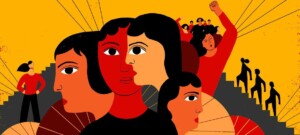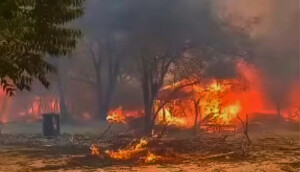At least 6 rapes during West and North Darfur violence
At least six women were raped during the violence that raged in the border region of West and North Darfur in early June. More displaced currently seek refuge in Saraf Omra town in North Darfur.
 A displaced family in North Darfur in 2015 (Hamid Abdulsalam/UNAMID)
A displaced family in North Darfur in 2015 (Hamid Abdulsalam/UNAMID)
At least six women were raped during the violence that raged in the border region of West and North Darfur in early June. More displaced currently seek refuge in Saraf Omra town in North Darfur.
Farah Ali, media coordinator for the newly displaced in Saraf Omra in North Darfur, told Radio Dabanga that at least six rapes were reported during the attacks on villages in Kulbus in northern West Darfur and neighbouring Saraf Omra between 6 and 11 June.
One of the rape cases was proven by a medical examination. The other victims refused to undergo a medical examination.
At least 125 people were killed in the attacks, mainly of the non-Arab Gimir tribe, in a conflict between the Gimir and Rizeigat, an Arab herding tribe.
RSF withdrawal
More groups of newly displaced people arrived in Saraf Omra from the Khakhkhakh area, north of the town, on Wednesday evening following the withdrawal of the three Rapid Support Forces* (RSF) vehicles that were charged with protecting the area.
Displaced people told Radio Dabanga that the withdrawal of the vehicles happened after a quarrel between the RSF paramilitaries with people living in the area over the theft of livestock.
Ali also told Radio Dabanga that the number of displaced people inside Saraf Omra town is 16,968 people at the moment, including 2,828 families.Most of them are children, women, and elderly people and that most of them found shelter in the homes of relatives in the Saraf Omra neighbourhoods.
Ali warned that they live in tragic conditions with no intervention or assistance by humanitarian organisations so far. They are in dire need of shelter, food, medicine, and clothes.
Funding
According to SudanPlusNews yesterday, Vice-President of the Sovereignty Council and RSF Commander Gen Mohamed ‘Hemeti’ Dagalo announced “the deduction of amounts of money from the regular forces – the army, the police, the RSF, and the General Intelligence Service (GIS) – for the establishment of a charitable fund to support the return of displaced and address the humanitarian situation in West Darfur”.
* The RSF was established by the Al Bashir regime in August 2013 and grew out of the janjaweed militias which fought for the Sudanese government in Darfur since the war broke out 2003 and were largely made up of Arab herding tribes. The RSF is widely believed to be responsible for atrocities in the Kordofan and Darfur regions in the past years. They are also held responsible for the violent break-up of the Khartoum sit-in in 2019, also known as the June 3 Massacre. The paramilitary force has always been commanded by Mohamed Hamdan ‘Hemeti’ Dagalo, who was sworn in as deputy president of Sudan's Sovereign Council on August 21, 2019 and has played an important role in the October 25 military coup.
The militia has reportedly built up a vast business empire that captures not only a large part of the country’s gold industry, but has huge interests in many sectors of the Sudanese economy as well. Tens of thousands of RSF troops also joined the Saudi-led campaign against the Houthi rebels in Yemen since 2015.











 and then
and then